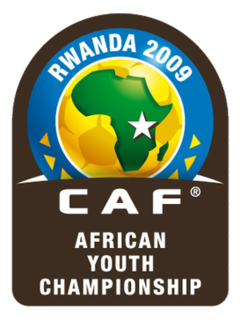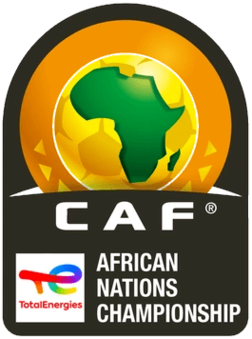Listed below are the dates and results for the 2006 FIFA World Cup qualification rounds for Africa. 51 teams took part, competing for 5 World Cup places.

The Zambia national football team represents Zambia in men's international association football and it is governed by the Football Association of Zambia (FAZ). During the 1980s, they were known as the KK 11, after founding president Dr. Kenneth Kaunda ("KK") who ruled Zambia from 1964 to 1991. After the country adopted multiparty politics, the side was nicknamed Chipolopolo, the "Copper Bullets". The team has three Africa Cup of Nations final appearances to its credit, winning the 2012 tournament with victory over Ivory Coast in the final. The team has never qualified for the FIFA World Cup finals.

The Mali national football team represents Mali in men's international football and is governed by the Malian Football Federation. The team's nickname is Les Aigles. They represent both FIFA and the Confederation of African Football (CAF).

The Benin national football team, nicknamed Les Écureuils , represents Benin in men's international association football and is controlled by the Benin Football Federation. They were known as the Dahomey national football team until 1975, when Republic of Dahomey became Benin. They have never qualified for the World Cup, but have reached four African Nations Cup in recent years, never placing in the top 2 in the group stage – 2004, 2008, 2010 and 2019. In 2019, they reached the knockouts as the third most successful third place team, before making the quarter-finals with a shock win over Morocco, but later lost to Senegal. On 8 February 2010 after the preliminary competition from the 2010 Africa Cup of Nations in Angola, the Benin Football Federation dissolved the national team, coach Henri Dussuyer and his complete staff were fired. On May 9, 2016, Benin was suspended from FIFA, The team represents both FIFA and Confederation of African Football (CAF).

The Chad national football team, nicknamed Sao, represents Chad in international football and is controlled by the Chadian Football Federation, the governing body for football in the country. The team has never qualified for the World Cup finals or Africa Cup of Nations. Home matches are played at the Idriss Mahamat Ouya Stadium. In April 2021, FIFA banned the Chad national football team from participating in global football over the Chadian government's interference with the Chadian Football Federation.

The individual member states of the African Union (AU) coordinate foreign policy through this agency, in addition to conducting their own international relations on a state-by-state basis. The AU represents the interests of African peoples at large in intergovernmental organizations (IGO's); for instance, it is a permanent observer at the United Nations' General Assembly.

The Confederation of African Football (CAF) section of the 2010 FIFA World Cup qualification saw teams compete for five berths in the final tournament in South Africa. The qualification stage doubled as the qualification stage for the 2010 African Cup of Nations, with fifteen teams qualifying for the finals held in Angola.

The 2009 African Youth Championship is a football tournament for under 20 players. It was held in Rwanda from 18 January until 1 February 2009. It also served as qualification for the 2009 FIFA U-20 World Cup.
The FIBA Africa Championship 2009 Qualification occurred on various dates between 4 August 2008 and 31 May 2009. It was used to determine which African national basketball teams would qualify for the FIBA Africa Championship 2009. Teams competed with other teams in their respective "zones" for a spot in the Championship tournament.
The 2011 CAF Champions League was the 47th edition of Africa's premier club football tournament organized by the Confederation of African Football (CAF), and the 15th edition under the current CAF Champions League format. The winner Espérance ST participated in the 2011 FIFA Club World Cup, and also played in the 2012 CAF Super Cup.

AfroBasket 2011 was the 26th FIBA Africa Championship, played under the auspices of the Fédération Internationale de Basketball, the basketball sport governing body, and the African zone thereof. At stake is the berth allocated to Africa in the 2012 Summer Olympics basketball tournament. The tournament was scheduled to be hosted by Côte d'Ivoire, with games to be played in Abidjan. However, in 2011 Madagascar was chosen as host replacement due to a political crisis in Côte d'Ivoire.

The Angola women's national football team represents Angola in international women's football and it is controlled by the Angolan Football Federation. Their best place on the FIFA Rankings was the 82nd place, in December 2003. The only tournaments that they qualified were the 1995 and 2002 African Women's Championships, and their best finish was as Semi-Finalists in the 1995 tournament. Angola has, in contrast to many other African countries, has never suffered a heavy defeat. They have seldom lost by more than two goals.

The African Nations Championship is a tournament for national association football teams organised every two years by Confederation of African Football (CAF) which was first announced on 11 September 2007. Only players who play in the domestic championship of their country of origin are eligible to compete.
The Zimbabwe women's national football team is the national women's football team of Zimbabwe and is overseen by the Zimbabwe Football Association (ZIFA). As of June 2017, they are ranked 86th in the world.

The TotalU-20 Africa Cup of Nations is the main international youth football competition for CAF nations, and is competed for by under 20 year olds. It is held every two years with the top 4 teams qualifying for the FIFA U-20 World Cup.
The African Youth Championship 1997 was held in Morocco. It also served as qualification for the 1997 FIFA World Youth Championship.
The qualification phase for the 2014 African Nations Championship was played from November 2012 to August 2013. Qualification was divided into the CAF Regional Zones. Each zone had either two or three teams that qualified for the final tournament in South Africa.

The 2016 African Nations Championship was the 4th edition of the African Nations Championship, the biennial international football championship organised by the Confederation of African Football (CAF) for the men's national teams of Africa featuring exclusively players from their respective national leagues. The tournament was held in Rwanda between 16 January and 7 February 2016. A total of 16 teams played in the tournament.
The 2016 Africa Women Cup of Nations qualification was a women's football competition which decided the participating teams of the 2016 Africa Women Cup of Nations.
The 2023 Africa Cup of Nations qualification matches will be organized by the Confederation of African Football (CAF) to decide the participating teams of the 2023 Africa Cup of Nations, the 34th edition of the international men's football championship of Africa. A total of 24 teams will qualify to play in the final tournament, including Ivory Coast, who qualify automatically as hosts.
 Libya qualified to CHAN - Côte d'Ivoire 2009.
Libya qualified to CHAN - Côte d'Ivoire 2009.










